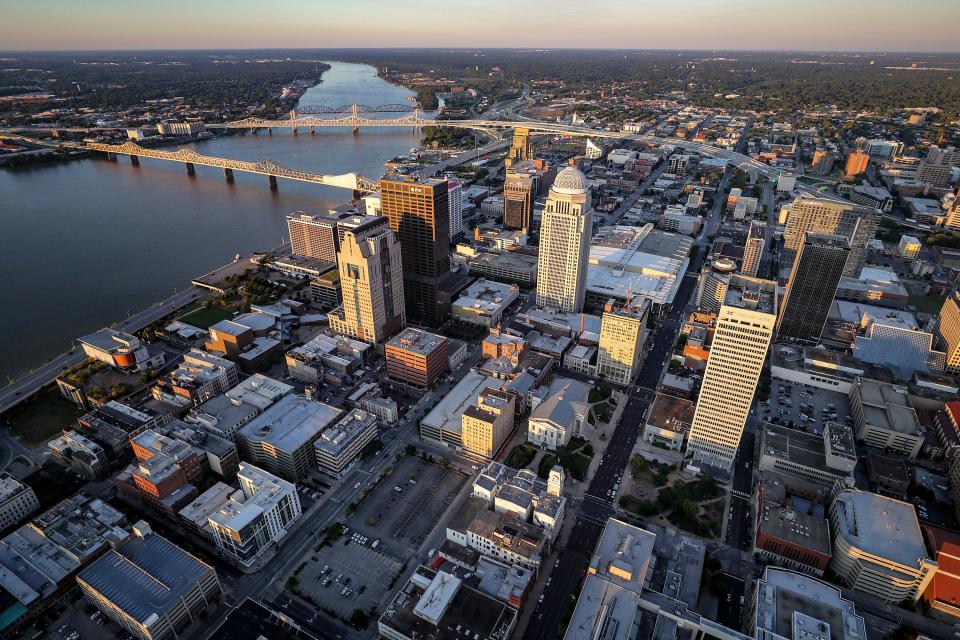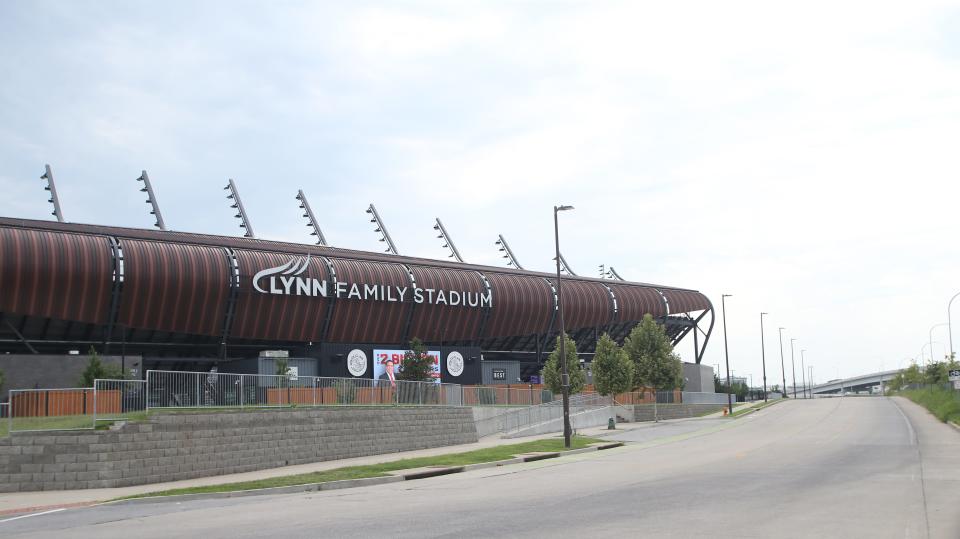How Louisville plans to boost economic development with affordable housing, new businesses
More affordable housing. A reimagined Belvedere. Increased support for new businesses. A new, cohesive city-wide branding.
All of these ideas and dozens more are pitched in an extensive new report aimed at strengthening Louisville for its current residents and elevating the city's profile on the national stage to spur further population and economic growth.
The draft report, released Thursday by Mayor Craig Greenberg's office, makes the case that while Louisville has rich resources, it faces “lackluster” population trends, disjointed economic development efforts, and racial disparities in poverty, degree attainment, and labor force participation rates.

“Louisville has unique competitive advantages but has not communicated them well or capitalized on them,” the report reads.
With a key focus on bolstering local talent while attracting new residents and investment to Louisville, the report lays out some big goals: Double the city’s growth rate, leading to 1 million residents by 2038; create at least 300 Black-owned businesses by 2027; and increase venture capital investment by 15% by 2030.
In August, Greenberg convened a group of some 80 leaders from the public, private and nonprofit spheres to help steer priorities and develop recommendations. Following a handful of stakeholder meetings and an online public input process, a 52-page draft was presented to stakeholders Thursday for final comment before its final release next month.
Some major proposals include:
Setting up pre-K programs for all 3- and 4-year-olds in Louisville by 2033
Spending $100 million over the next decade on redesigning streetscapes downtown
Creating a new public-private organization to steer economic development. With a suggested $6 million annual budget, this group of about 30 community stakeholders would be tasked with furthering the report’s strategies and monitoring outcomes.
Many of the ideas proposed in the draft report were previewed in the mayor’s legislative agenda unveiled in October, ahead of the upcoming Kentucky General Assembly session. He's seeking $250 million for capital improvements across the city.
Vowing it won’t “sit on a shelf,” Greenberg stressed urgency around the report’s many proposals.
“This plan requires us to join together in unprecedented ways to execute this strategy, measure our success, and be recognized locally and nationally among the great cities in our country,” Greenberg said in the report. “Moving rapidly in a new direction requires thinking big, taking calculated risks, and delivering transformational results over the next five years.”
Louisville Metro Government spent $150,000 on the strategic plan creation, hiring economic development firm Ginovus and consulting and management firm TPMA, both based in Indiana.
Here’s a look at what’s proposed.
Making 'quality of place' investments

The report’s recommendations are split into four main themes. The largest of these areas, “quality of place,” focuses on improvements to the city’s physical landscape and quality-of-live initiatives aimed at making Louisville a more desirable place to live.
“Quality of place is the key underpinning for talent attraction and retention,” said Larry Gigerich, Ginovus executive managing director, at Thursday’s stakeholder meeting. “It also shows that you’re investing in yourself."
While many recommendations do focus on downtown Louisville, a slew of others speak to place-making in all city neighborhoods, including “international town centers” to highlight the city’s immigrant communities and commission of public art across the county.
Among the recommendations:
Emphasize Louisville’s connection to its waterfront by making pedestrian-focused improvements to Interstate 65 underpasses and transforming the Belvedere into a “world-class public space.”
Fully staff the Louisville Metro Police Department by 2027. No specific staffing level is mentioned in the draft report.
Create and preserve 15,000 affordable housing units, a Greenberg campaign trail goal.
Plant 20,000 trees by 2029 to strengthen the tree canopy, complete the second half of the Louisville Loop trail system and invest in the Fairdale neighborhood to create a gateway into Jefferson Memorial Forest.
Add direct flights from Muhammad Ali International Airport to five large metropolitan destinations, including two international sites.
Set up a fund with the state legislature to repurpose downtown office buildings for residential and hospitality use. Greenberg said in October he’s asking the state legislature for $30 million for this effort.
Make downtown more pedestrian-friendly by expediting the conversion of one-way streets.
Invest in roadway and other improvements around Lynn Family Stadium to support the proposed mixed-use development of the area. Louisville is seeking $12 million from the state for this effort.
Invest $5 million toward bringing grocery stores to neighborhoods that lack fresh food access.
Commit to breaking ground on the Reimagine 9th Street project by 2025.
Focusing on bolstering education, skills
While the report notes that the 21 higher education institutions within greater Louisville are a great resource, it also says Louisville’s rates for labor force participation and educational attainment are lower than its peers.
Key to future economic success is developing the pipeline of future workers, keeping youth from leaving Kentucky, and making Louisville attractive for which outsiders can relocate.
“A child who’s in middle school today will enter the workforce within 10 years,” Greenberg said. “And what will they find? What do they want to find? And what do we want them to find right here in Louisville?”
Among the recommendations:
Implement the findings of the “early learning action group” formed by Greenberg in June 2023.
Encourage local businesses to be partners in college and career readiness programs.
Expand community-based workforce development programs, such as The Spot, AMPED and the Louisville Urban League’s Center for Workforce Development.
Create a “boomerang” campaign to entice those with ties to the city to move back to Louisville.
Support the creation and support of international business associations and mentorships. The report notes that Louisville’s best chance for population growth is by attracting foreign-born residents.
Recruit out-of-state professionals by expanding local college alumni networks and starting talent recruitment programs.
Create stronger connections between higher education and employers for internships and apprenticeships.
Increasing access to capital
In its analysis of the Louisville area, Ginovus found the city had the second lowest startup business employment of peer cities from 2017-2022 and trailed most peers in levels of angel and venture capital.
“Many resources exist for prospective entrepreneurs in Louisville, but the systems for connecting individuals to those resources are disjointed and could be improved,” according to the report.
Goals include upping total venture capital investment by 15% by 2030 and issuing $4 million in loans to small businesses over the next four years.
Possible action steps include:
Seek $20 million yearly from the state legislature for the Kentucky Investment Fund Tax Credit, to help drive business growth and job creation.
Increase funding to capital organizations.
Expand the Kentucky Business Investment program to apply to additional types of businesses.
Develop incentive and mentorship programs to support up-and-coming businesses.
To promote and attract investment, cut permitting and zoning timelines by at least 25%.
“Big ideas” are scattered throughout the report, one of which is the creation of a Business Engagement Center through the University of Louisville. It would be a hub for entrepreneurs, providing subsidized and flexible workspaces, mentorship and other programming.
“We understand that all of this might not happen, but as a community, we’ve got to think big like we have before and work on more than one big thing at a time,” Greenberg said. “But if we’re not striving to achieve big, bold goals like that, we won’t materially change the trajectory of our community.”
Pitching Louisville as an attractive place to live

As Louisville competes with other metro areas for business and talent, it needs an authentic story to help sell it, the report’s author told stakeholders Thursday at their meeting at Brown-Forman headquarters.
“It wasn’t that Louisville had a negative brand. It had no brand,” Gigerich said. “And that’s a really bad place to be.”
The report pitches the hiring of local and national public relations firms to do brand research and focus groups, leading to the creation of a “long-term and broadly used” brand that’s both forward-looking and tied to Louisville’s history and roots.
What happens after the final report is released?
A finalized report is due in mid-December, incorporating the input of the stakeholder group and any public comment received via the city’s website.
Stakeholders in attendance Thursday commended the wide range of ideas but called for more specifics around funding and addressing racial disparities.
Greenberg said work on the initiatives will begin in earnest after the winter holidays, with the creation of the public-private economic development organization happening by July 1 at the latest.
A number of the proposed initiatives seek funding from Frankfort. The legislative session runs from Jan. 2 to April 15. Other funding sources include the Louisville Metro Government, philanthropy and corporate partnerships.
Growth & development reporter Matthew Glowicki can be reached at mglowicki@courier-journal.com, 502-582-4000 or on Twitter @mattglo.
This article originally appeared on Louisville Courier Journal: What's proposed in Louisville's sweeping economic development plan

